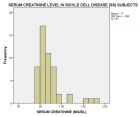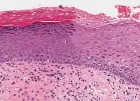Abstract
Research Article
SARS-CoV-2 antibody response to third dose vaccination in a healthy cohort
Simmi Patel*, Sarah E Wheeler, Adam Anderson, Lisa Pinto and Michael R Shurin
Published: 23 November, 2022 | Volume 6 - Issue 1 | Pages: 008-013
Determining the extent of immunity induced by booster doses of COVID-19 vaccinations is crucial for informing recommendations for booster dose regimens as well as constant adjustments of immunization strategies amongst different groups of people within the population. The study involved 31 healthy volunteers (majority were healthcare professionals) who completed either vaccination course with Pfizer or Moderna mRNA vaccines and received a third dose of the vaccine. Here we report results on the evaluation of an antibody response to four different SARS-CoV-2 antigens: RBD, S1, S2 and nucleocapsid prior to third dose and two and four weeks after a booster vaccination. We detected a peak of high titers of antibodies after the third dose with a gradual decline after four weeks. No significant differences were seen between the two vaccines in terms of antibody response. There were no gender discrepancies between the two vaccines. Our results suggest that: third doses are necessary due to the emergence of different SARS-CoV-2 variants and postvaccination antibody testing continues be essential in determining possible standardization of SARS-CoV-2 vaccines regimens.
Read Full Article HTML DOI: 10.29328/journal.icci.1001020 Cite this Article Read Full Article PDF
Keywords:
SARS-CoV-2; Boosting vaccination; Antibody; Serology; Vaccine response
References
- Polack FP, Thomas SJ, Kitchin N, Absalon J, Gurtman A, Lockhart S, Perez JL, Pérez Marc G, Moreira ED, Zerbini C, Bailey R, Swanson KA, Roychoudhury S, Koury K, Li P, Kalina WV, Cooper D, Frenck RW Jr, Hammitt LL, Türeci Ö, Nell H, Schaefer A, Ünal S, Tresnan DB, Mather S, Dormitzer PR, Şahin U, Jansen KU, Gruber WC; C4591001 Clinical Trial Group. Safety and Efficacy of the BNT162b2 mRNA Covid-19 Vaccine. N Engl J Med. 2020 Dec 31;383(27):2603-2615. doi: 10.1056/NEJMoa2034577. Epub 2020 Dec 10. PMID: 33301246; PMCID: PMC7745181.
- Thomas SJ, Moreira ED Jr, Kitchin N, Absalon J, Gurtman A, Lockhart S, Perez JL, Pérez Marc G, Polack FP, Zerbini C, Bailey R, Swanson KA, Xu X, Roychoudhury S, Koury K, Bouguermouh S, Kalina WV, Cooper D, Frenck RW Jr, Hammitt LL, Türeci Ö, Nell H, Schaefer A, Ünal S, Yang Q, Liberator P, Tresnan DB, Mather S, Dormitzer PR, Şahin U, Gruber WC, Jansen KU; C4591001 Clinical Trial Group. Safety and Efficacy of the BNT162b2 mRNA Covid-19 Vaccine through 6 Months. N Engl J Med. 2021 Nov 4;385(19):1761-1773. doi: 10.1056/NEJMoa2110345. Epub 2021 Sep 15. PMID: 34525277; PMCID: PMC8461570.
- Wheeler SE, Shurin GV, Yost M, Anderson A, Pinto L, Wells A, Shurin MR. Differential Antibody Response to mRNA COVID-19 Vaccines in Healthy Subjects. Microbiol Spectr. 2021 Sep 3;9(1):e0034121. doi: 10.1128/Spectrum.00341-21. Epub 2021 Aug 4. PMID: 34346750; PMCID: PMC8552678.
- Chemaitelly H, Tang P, Hasan MR, AlMukdad S, Yassine HM, Benslimane FM, Al Khatib HA, Coyle P, Ayoub HH, Al Kanaani Z, Al Kuwari E, Jeremijenko A, Kaleeckal AH, Latif AN, Shaik RM, Abdul Rahim HF, Nasrallah GK, Al Kuwari MG, Al Romaihi HE, Butt AA, Al-Thani MH, Al Khal A, Bertollini R, Abu-Raddad LJ. Waning of BNT162b2 Vaccine Protection against SARS-CoV-2 Infection in Qatar. N Engl J Med. 2021 Dec 9;385(24):e83. doi: 10.1056/NEJMoa2114114. Epub 2021 Oct 6. PMID: 34614327; PMCID: PMC8522799.
- Flisiak R, Pawłowska M, Rogalska-Płońska M, Bociąga-Jasik M, Kłos K, Piekarska A, Zarębska-Michaluk D. Effect of COVID-19 on Anti-S Antibody Response in Healthcare Workers Six Months Post-Vaccination. Vaccines (Basel). 2021 Nov 15;9(11):1325. doi: 10.3390/vaccines9111325. PMID: 34835257; PMCID: PMC8618383.
- Bal A, Pozzetto B, Trabaud MA, Escuret V, Rabilloud M, Langlois-Jacques C, Paul A, Guibert N, D'Aubarède-Frieh C, Massardier-Pilonchery A, Fabien N, Goncalves D, Boibieux A, Morfin-Sherpa F, Pitiot V, Gueyffier F, Lina B, Fassier JB, Trouillet-Assant S; COVID SER Study Group. Evaluation of High-Throughput SARS-CoV-2 Serological Assays in a Longitudinal Cohort of Patients with Mild COVID-19: Clinical Sensitivity, Specificity, and Association with Virus Neutralization Test. Clin Chem. 2021 Apr 29;67(5):742-752. doi: 10.1093/clinchem/hvaa336. PMID: 33399823; PMCID: PMC7929008.
- Xia X. Domains and Functions of Spike Protein in Sars-Cov-2 in the Context of Vaccine Design. Viruses. 2021 Jan 14;13(1):109. doi: 10.3390/v13010109. PMID: 33466921; PMCID: PMC7829931.
- Huang Y, Yang C, Xu XF, Xu W, Liu SW. Structural and functional properties of SARS-CoV-2 spike protein: potential antivirus drug development for COVID-19. Acta Pharmacol Sin. 2020 Sep;41(9):1141-1149. doi: 10.1038/s41401-020-0485-4. Epub 2020 Aug 3. PMID: 32747721; PMCID: PMC7396720.
- Bonifacius A, Tischer-Zimmermann S, Dragon AC, Gussarow D, Vogel A, Krettek U, Gödecke N, Yilmaz M, Kraft ARM, Hoeper MM, Pink I, Schmidt JJ, Li Y, Welte T, Maecker-Kolhoff B, Martens J, Berger MM, Lobenwein C, Stankov MV, Cornberg M, David S, Behrens GMN, Witzke O, Blasczyk R, Eiz-Vesper B. COVID-19 immune signatures reveal stable antiviral T cell function despite declining humoral responses. Immunity. 2021 Feb 9;54(2):340-354.e6. doi: 10.1016/j.immuni.2021.01.008. PMID: 33567252; PMCID: PMC7871825.
- Wang Z, Schmidt F, Weisblum Y, Muecksch F, Barnes CO, Finkin S, Schaefer-Babajew D, Cipolla M, Gaebler C, Lieberman JA, Oliveira TY, Yang Z, Abernathy ME, Huey-Tubman KE, Hurley A, Turroja M, West KA, Gordon K, Millard KG, Ramos V, Da Silva J, Xu J, Colbert RA, Patel R, Dizon J, Unson-O'Brien C, Shimeliovich I, Gazumyan A, Caskey M, Bjorkman PJ, Casellas R, Hatziioannou T, Bieniasz PD, Nussenzweig MC. mRNA vaccine-elicited antibodies to SARS-CoV-2 and circulating variants. Nature. 2021 Apr;592(7855):616-622. doi: 10.1038/s41586-021-03324-6. Epub 2021 Feb 10. PMID: 33567448; PMCID: PMC8503938.
- Walsh EE, Frenck RW Jr, Falsey AR, Kitchin N, Absalon J, Gurtman A, Lockhart S, Neuzil K, Mulligan MJ, Bailey R, Swanson KA, Li P, Koury K, Kalina W, Cooper D, Fontes-Garfias C, Shi PY, Türeci Ö, Tompkins KR, Lyke KE, Raabe V, Dormitzer PR, Jansen KU, Şahin U, Gruber WC. Safety and Immunogenicity of Two RNA-Based Covid-19 Vaccine Candidates. N Engl J Med. 2020 Dec 17;383(25):2439-2450. doi: 10.1056/NEJMoa2027906. Epub 2020 Oct 14. PMID: 33053279; PMCID: PMC7583697.
- Krammer F, Srivastava K, Alshammary H, Amoako AA, Awawda MH, Beach KF, Bermúdez-González MC, Bielak DA, Carreño JM, Chernet RL, Eaker LQ, Ferreri ED, Floda DL, Gleason CR, Hamburger JZ, Jiang K, Kleiner G, Jurczyszak D, Matthews JC, Mendez WA, Nabeel I, Mulder LCF, Raskin AJ, Russo KT, Salimbangon AT, Saksena M, Shin AS, Singh G, Sominsky LA, Stadlbauer D, Wajnberg A, Simon V. Antibody Responses in Seropositive Persons after a Single Dose of SARS-CoV-2 mRNA Vaccine. N Engl J Med. 2021 Apr 8;384(14):1372-1374. doi: 10.1056/NEJMc2101667. Epub 2021 Mar 10. PMID: 33691060; PMCID: PMC8008743.
- Amanat F, Thapa M, Lei T, Sayed Ahmed SM, Adelsberg DC, Carreno JM, et al. The plasmablast response to SARS-CoV-2 mRNA vaccination is dominated by non-neutralizing antibodies and targets both the NTD and the RBD. medRxiv. 2021; 2021.03.07.21253098.
- Yoshimura Y, Sasaki H, Miyata N, Miyazaki K, Tachikawa N. Antibody response after COVID-19 vaccine BNT162b2 on health care workers in Japan. J Infect Chemother. 2021 Dec;27(12):1713-1715. doi: 10.1016/j.jiac.2021.08.008. Epub 2021 Aug 12. PMID: 34412983; PMCID: PMC8358099.
- Manisty C, Otter AD, Treibel TA, McKnight Á, Altmann DM, Brooks T, Noursadeghi M, Boyton RJ, Semper A, Moon JC. Antibody response to first BNT162b2 dose in previously SARS-CoV-2-infected individuals. Lancet. 2021 Mar 20;397(10279):1057-1058. doi: 10.1016/S0140-6736(21)00501-8. Epub 2021 Feb 25. PMID: 33640038; PMCID: PMC7972310.
- Vietri MT, D'Elia G, Caliendo G, Passariello L, Albanese L, Molinari AM, Angelillo IF. Antibody levels after BNT162b2 vaccine booster and SARS-CoV-2 Omicron infection. Vaccine. 2022 Sep 16;40(39):5726-5731. doi: 10.1016/j.vaccine.2022.08.045. Epub 2022 Aug 26. PMID: 36041940; PMCID: PMC9411148.
- Vietri MT, Albanese L, Passariello L, D'Elia G, Caliendo G, Molinari AM, Angelillo IF. Evaluation of neutralizing antibodies after vaccine BNT162b2: Preliminary data. J Clin Virol. 2022 Jan;146:105057. doi: 10.1016/j.jcv.2021.105057. Epub 2021 Dec 14. PMID: 34923323; PMCID: PMC8670104.
- Lanz TV, Brewer RC, Jahanbani S, Robinson WH. Limited Neutralization of Omicron by Antibodies from the BNT162b2 Vaccination against SARS-CoV-2. 2022; https://www.researchsquare.com/article/rs-1518378/v1
- Matula Z, Gönczi M, Bekő G, Kádár B, Ajzner É, Uher F, Vályi-Nagy I. Antibody and T Cell Responses against SARS-CoV-2 Elicited by the Third Dose of BBIBP-CorV (Sinopharm) and BNT162b2 (Pfizer-BioNTech) Vaccines Using a Homologous or Heterologous Booster Vaccination Strategy. Vaccines (Basel). 2022 Mar 30;10(4):539. doi: 10.3390/vaccines10040539. PMID: 35455288; PMCID: PMC9025723.
- Cerutti G, Guo Y, Zhou T, Gorman J, Lee M, Rapp M, Reddem ER, Yu J, Bahna F, Bimela J, Huang Y, Katsamba PS, Liu L, Nair MS, Rawi R, Olia AS, Wang P, Zhang B, Chuang GY, Ho DD, Sheng Z, Kwong PD, Shapiro L. Potent SARS-CoV-2 neutralizing antibodies directed against spike N-terminal domain target a single supersite. Cell Host Microbe. 2021 May 12;29(5):819-833.e7. doi: 10.1016/j.chom.2021.03.005. Epub 2021 Mar 12. PMID: 33789084; PMCID: PMC7953435.
- Suthar MS, Zimmerman MG, Kauffman RC, Mantus G, Linderman SL, Hudson WH, Vanderheiden A, Nyhoff L, Davis CW, Adekunle O, Affer M, Sherman M, Reynolds S, Verkerke HP, Alter DN, Guarner J, Bryksin J, Horwath MC, Arthur CM, Saakadze N, Smith GH, Edupuganti S, Scherer EM, Hellmeister K, Cheng A, Morales JA, Neish AS, Stowell SR, Frank F, Ortlund E, Anderson EJ, Menachery VD, Rouphael N, Mehta AK, Stephens DS, Ahmed R, Roback JD, Wrammert J. Rapid Generation of Neutralizing Antibody Responses in COVID-19 Patients. Cell Rep Med. 2020 Jun 23;1(3):100040. doi: 10.1016/j.xcrm.2020.100040. Epub 2020 Jun 8. PMID: 32835303; PMCID: PMC7276302.
- Huhn G, Poorbaugh J, Zhang L, Beasley S, Nirula A, Brothers J, Welbel S, Wilson J, Gillani S, Weber KM, Morack R, Keckler K, Benschop RJ. COVID-19 symptom relationship to antibody response and ACE2 neutralization in recovered health systems employees before and after mRNA BNT162b2 COVID-19 vaccine. PLoS One. 2022 Sep 9;17(9):e0273323. doi: 10.1371/journal.pone.0273323. PMID: 36083883; PMCID: PMC9462709.
- Cassone A, Cauda R. Multicomponent vaccines to fight SARS-CoV-2 variants of concern. Vaccine. 2021 Nov 26;39(48):6969-6971. doi: 10.1016/j.vaccine.2021.10.069. Epub 2021 Nov 1. PMID: 34743927; PMCID: PMC8557988.
- Poland GA, Ovsyannikova IG, Kennedy RB. The need for broadly protective COVID-19 vaccines: Beyond S-only approaches. Vaccine. 2021 Jul 13;39(31):4239-4241. doi: 10.1016/j.vaccine.2021.06.028. Epub 2021 Jun 14. PMID: 34167836; PMCID: PMC8200305.
Figures:
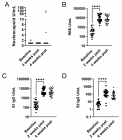
Figure 1
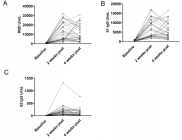
Figure 2
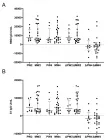
Figure 3
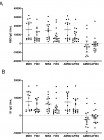
Figure 4
Similar Articles
-
SARS-CoV-2 antibody response to third dose vaccination in a healthy cohortSimmi Patel*,Sarah E Wheeler,Adam Anderson,Lisa Pinto,Michael R Shurin. SARS-CoV-2 antibody response to third dose vaccination in a healthy cohort. . 2022 doi: 10.29328/journal.icci.1001020; 6: 008-013
Recently Viewed
-
Diabetes and red blood cell parametersMd. Sadikuj Jaman*,Md. Sohanur Rahman,Rubaiya Rafique Swarna,Joyanto Mahato,Md. Milon Miah,Mosa. Ayshasiddeka. Diabetes and red blood cell parameters. Ann Clin Endocrinol Metabol. 2018: doi: 10.29328/journal.acem.1001004; 2: 001-009
-
Sustainable Development Work Aimed at Promoting Mental Health among Municipal Adult Students with Mental Health ProblemsUlla Damber*, Lena Randevåg. Sustainable Development Work Aimed at Promoting Mental Health among Municipal Adult Students with Mental Health Problems. Insights Depress Anxiety. 2023: doi: 10.29328/journal.ida.1001037; 7: 016-017
-
Optimizing Treatment of Depression, Trauma, and Anxiety Disorders through Neurophysiological InterventionsKees Blasé*. Optimizing Treatment of Depression, Trauma, and Anxiety Disorders through Neurophysiological Interventions. Insights Depress Anxiety. 2025: doi: 10.29328/journal.ida.1001046; 9: 027-029
-
Gentian Violet Modulates Cytokines Levels in Mice Spleen toward an Anti-inflammatory ProfileSalam Jbeili, Mohamad Rima, Abdul Rahman Annous, Abdo Ibrahim Berro, Ziad Fajloun, Marc Karam*. Gentian Violet Modulates Cytokines Levels in Mice Spleen toward an Anti-inflammatory Profile. Arch Asthma Allergy Immunol. 2024: doi: 10.29328/journal.aaai.1001034; 8: 001-006
-
Trypanosoma dionisii as an experimental model to study anti-Trypanosoma cruzi drugs: A comparative analysis with benznidazole, posaconazole and amiodaroneDe Souza W*,Barrias ES,Borges TR. Trypanosoma dionisii as an experimental model to study anti-Trypanosoma cruzi drugs: A comparative analysis with benznidazole, posaconazole and amiodarone. Int J Clin Microbiol Biochem Technol. 2018: doi: 10.29328/journal.ijcmbt.1001003; 1: 014-023
Most Viewed
-
Impact of Latex Sensitization on Asthma and Rhinitis Progression: A Study at Abidjan-Cocody University Hospital - Côte d’Ivoire (Progression of Asthma and Rhinitis related to Latex Sensitization)Dasse Sery Romuald*, KL Siransy, N Koffi, RO Yeboah, EK Nguessan, HA Adou, VP Goran-Kouacou, AU Assi, JY Seri, S Moussa, D Oura, CL Memel, H Koya, E Atoukoula. Impact of Latex Sensitization on Asthma and Rhinitis Progression: A Study at Abidjan-Cocody University Hospital - Côte d’Ivoire (Progression of Asthma and Rhinitis related to Latex Sensitization). Arch Asthma Allergy Immunol. 2024 doi: 10.29328/journal.aaai.1001035; 8: 007-012
-
Causal Link between Human Blood Metabolites and Asthma: An Investigation Using Mendelian RandomizationYong-Qing Zhu, Xiao-Yan Meng, Jing-Hua Yang*. Causal Link between Human Blood Metabolites and Asthma: An Investigation Using Mendelian Randomization. Arch Asthma Allergy Immunol. 2023 doi: 10.29328/journal.aaai.1001032; 7: 012-022
-
An algorithm to safely manage oral food challenge in an office-based setting for children with multiple food allergiesNathalie Cottel,Aïcha Dieme,Véronique Orcel,Yannick Chantran,Mélisande Bourgoin-Heck,Jocelyne Just. An algorithm to safely manage oral food challenge in an office-based setting for children with multiple food allergies. Arch Asthma Allergy Immunol. 2021 doi: 10.29328/journal.aaai.1001027; 5: 030-037
-
Snow white: an allergic girl?Oreste Vittore Brenna*. Snow white: an allergic girl?. Arch Asthma Allergy Immunol. 2022 doi: 10.29328/journal.aaai.1001029; 6: 001-002
-
Cytokine intoxication as a model of cell apoptosis and predict of schizophrenia - like affective disordersElena Viktorovna Drozdova*. Cytokine intoxication as a model of cell apoptosis and predict of schizophrenia - like affective disorders. Arch Asthma Allergy Immunol. 2021 doi: 10.29328/journal.aaai.1001028; 5: 038-040

If you are already a member of our network and need to keep track of any developments regarding a question you have already submitted, click "take me to my Query."










